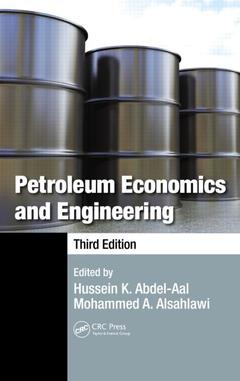Description
Petroleum Economics and Engineering (3rd Ed.)
Coordinators: Abdel-Aal Hussein K., Alsahlawi Mohammed A.
Language: English
Subject for Petroleum Economics and Engineering:
Keywords
Crude Oil; Annual Depreciation Costs; Oil Fractionation; Present Worth; Natural Gas Liquids; Gas Oil; Oil Reserve Estimate; Gas Oil Separators; Return on Investment; NGL Recovery; Petroleum Products; OPEC Annual Statistical Bulletin; World Oil and Gas Supply and Demand; DGA; Natural Gas; GOSP; Crude Oil Properties; Wells Drilling; Catalytic Cracking; Transportation; Sinking Fund; Pipelines; Fixed Costs; Refining; API Gravity; Risk and Uncertainty; Catalytic Reforming; Break Even Analysis; Atmospheric Distillation; Optimization; Diesel Oil; Cash Flow; Ye Ar; Payout Period; Microsoft Excel Solver; Depreciation; CI; Oil Production; Gor; Oil Reserves; Fu El; Vacuum Distillation; ABC Company; FCC Gasoline
· 15.6x23.4 cm · Hardback
Description
/li>Contents
/li>Readership
/li>Biography
/li>
This book explains how to apply economic analysis to the evaluation of engineering challenges in the petroleum industry. Discussion progresses from an introduction to the industry, through principles and techniques of engineering economics, to the application of economic methods. Packed with real-world examples and case studies demonstrating how to calculate rate of return, discounted cash flow, payout period, and more, Petroleum Economics and Engineering, Third Edition assists petroleum engineers, chemical engineers, production workers, management, and executives in sound economic decision-making regarding the design, manufacture, and operation of oil and gas plants, equipment, and processes.
The fully revised third edition is updated to reflect key advancements in petroleum technology and expanded to include chapters on middle stream operations, known as surface petroleum operations (SPO), and natural gas processing and fractionation. By looking globally at the hydrocarbon industry, the improved text offers the reader a more complete picture of the petroleum sector, which includes the global processes of exploration, production, refining, and transportation.
World Oil and Gas Supply and Demand. Structure of the Oil and Gas Industry. Characteristics of Crude Oil and Properties of Petroleum Products. Time Value of Money (TVM) in Capital Expenditures. Depreciation and Depletion in Oil Projects. Financial Measures and Profitability Analysis. Analysis of Alternative Selections and Replacements. Risk, Uncertainty, and Decision Analysis. Break-Even and Sensitivity Analysis. Optimization Techniques. Exploration and Drilling. Reserves and Reserve Estimate. Production Operations. Gas-Oil Separation. Crude Oil Treatment: Dehydration, Desalting, and Stabilization. Gas Treatment and Conditioning. Crude Oil Refining: Physical Separation. Crude Oil Refining: Chemical Conversion. Natural Gas Processing: Recovery, Separation, and Fractionation of NGL (Natural Gas Liquids). Oil and Gas Transportation.
Hussein K. Abdel-Aal is emeritus professor for National Research Center (NRC), Cairo, Egypt and King Fahd University of Petroleum and Minerals (KFUPM), Dhahran, Saudi Arabia. He received his BS from Alexandria University, Egypt and his MS and Ph.D from Texas A&M University, College Station, USA. He has worked as process engineer for Suez oil refineries, headed KFUPM’s Chemical Engineering Department, served as visiting professor for Texas A&M, and headed NRC’s Solar Energy Department. He has contributed to over 90 technical papers, edited one book on petroleum economics and engineering, and authored Petroleum and Gas Field Processing. An AIChE member and fellow, he is founder of the board for the International Association of Hydrogen Energy, Miami, Florida, USA.
Mohammed A. Alsahlawi is a previous dean and current professor for King Fahd University of Petroleum and Minerals (KFUPM), Dhahran, Saudi Arabia. He holds a BS and MBA from KFUPM and a Ph.D from University of Wisconsin-Milwaukee, USA. He has served as manager of KFUPM’s Economic and Industrial Research Division; head of the News Agency and Information Department for the Organization of the Petroleum Exporting Countries, Vienna, Austria; member of the Advisory Board of the Saudi Arabian Supreme Economic Council, Riyadh; and director of the Human Resources Development Fund, Riyadh, Saudi Arabia. He also was the first president of the Saudi Association for Energy Economics.



